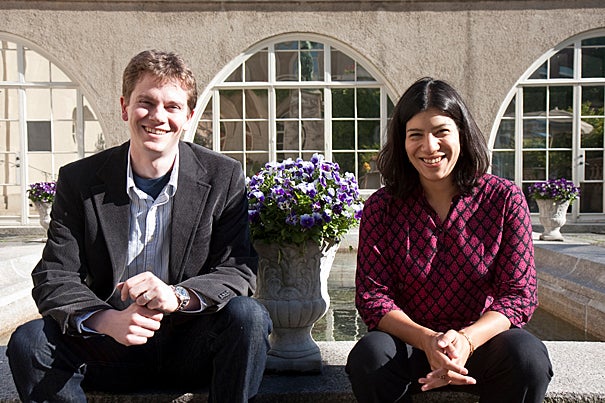
Tobias Ritter (left) and Maya Jasanoff are being recognized with the Roslyn Abramson Award. “The greatest teachers continue to shape their students for many years after graduation,” said FAS Dean Michael D. Smith. “By all accounts, Maya Jasanoff and Tobias Ritter are among those elite educators whose impact will be profound, if not lifelong.”
Jon Chase/Harvard Staff Photographer
‘Remarkable teachers’
Maya Jasanoff and Tobias Ritter win Abramson Award
Historian Maya Jasanoff and chemist Tobias Ritter are this year’s winners of the Roslyn Abramson Award, given annually to assistant or associate professors for excellence in undergraduate teaching.
The award, which includes funding for summer salary or research, goes to “a faculty member in the Faculty of Arts and Sciences [FAS] in recognition of his or her excellence and sensitivity in teaching undergraduates.”
“The greatest teachers continue to shape their students for many years after graduation,” said FAS Dean Michael D. Smith, the John H. Finley Jr. Professor of Engineering and Applied Sciences. “By all accounts, Maya Jasanoff and Tobias Ritter are among those elite educators whose impact will be profound, if not lifelong. Their great enthusiasm for their subject matter is always tempered by keen sensitivity to their students’ interests and needs. I offer my heartiest congratulations to these remarkable teachers and scholars on receiving the Abramson Award.”
Maya Jasanoff
“I believe in bringing out the ‘story’ within history,” said Jasanoff, an associate professor of history who teaches courses on Britain and the British Empire. “My lectures tend to focus on particular individuals and episodes as a way of bringing to life otherwise abstract forces and trends.”
One of the great pleasures of teaching British history, she said, is that no language barrier separates American students from British historical sources. Her courses draw on a rich variety of materials — fiction, paintings, archival footage, and music — to enrich students’ understanding of the past, and their ability to analyze various sources.
“I believe that teaching and studying the past can make us more informed, responsible citizens in the present,” Jasanoff said. “I hope that students come away from my courses not only with a clear understanding of specific historical moments, but also with a better understanding of what we have inherited from the past — and how we may in turn be shaping legacies for the future.”
A member of the Harvard faculty since 2007, Jasanoff has taught “Britain Since 1760: Island, Europe, Empire,” a General Education course titled “The British Empire,” and an undergraduate reading seminar on “The Rise of the British Empire, 1757-1857.”
“Students continually raise challenging questions and ideas that make me think about my subject from new angles,” Jasanoff said. “In fact, I am currently designing a seminar related to my next book project, ‘The Worlds of Joseph Conrad,’ partly for the selfish reason that I want to hear Harvard students’ insights on the subject.”
Jasanoff, who said the digital age has opened fresh possibilities in teaching history, hopes to use the Abramson Award to explore new ways of incorporating tailor-made digital materials into her teaching.
Tobias Ritter
Tobias Ritter, who teaches in the notoriously challenging field of organic chemistry, admits he sets a high bar for his students.
On the five-point scale students use to assess courses in the registrar’s Q evaluations, “my difficulty rating has never been below 4.5,” said the assistant professor of chemistry and chemical biology.
Ritter eases the way for his students by striving to be clear when teaching and by taking all student questions seriously. He encourages his teaching staff to work as a team to provide students with as much support as possible.
“But at the end of the day, the students themselves need to work very hard to succeed in my classes,” Ritter said. “I know that I am asking a lot and that I am tough when it comes to achieving set goals for a class. But I am very explicit about it from the beginning, and I believe the students appreciate that honesty and transparency.”
Ritter, who has taught at Harvard since 2006 and is currently preparing a new advanced class on organometallics in organic synthesis, said he is motivated by the excitement of students and their insightful questions.
“It is rewarding to see that students like what I also care about deeply,” he said.
Ritter plans to use the money accompanying the Abramson Award to benefit the undergraduates in his research group.




